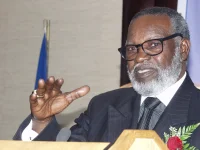Sam Nujoma's passing marks a pivotal moment in evaluating his legacy as Namibia's founding leader. His achievements and deliberate choices profoundly shaped the nation's trajectory.
The name "Shafiishuna," meaning lightning, embodied his dynamic approach to the independence movement. Between 1960 and 1970, Nujoma and his small group of supporters transformed Namibian independence into an international cause. His tireless advocacy elevated SWAPO's status, leading the United Nations to recognize it as the legitimate voice of the Namibian people by the mid-1970s. His constant movement between locations reflected his dedication to lobbying, negotiating, and representing his cause.
Nujoma's political philosophy centered on African nationalism rather than strict socialist or capitalist ideologies. This pragmatic stance enabled SWAPO to navigate Cold War dynamics effectively, securing military support from the Soviet bloc alongside material and educational aid from Western nations. His skepticism toward communism later facilitated practical policymaking in post-1990 Namibia.
Though he began as leader of the Ovamboland People's Organisation, Nujoma recognized the importance of inclusive nationalism. He expanded SWAPO's reach across Namibia, forming alliances with leaders like Hendrik Witbooi. This commitment to unity persisted despite challenges, including the complex integration of Caprivian leaders. The tragic detainee crisis of the 1980s revealed limitations in his control, yet his "One Namibia, One Nation" vision enabled him to establish a diverse, multi-ethnic cabinet in 1990.
His decision to serve three presidential terms drew criticism for potentially hampering democratic progress. However, Nujoma's restraint became evident through his firm adherence to constitutional limits. This choice stands in stark contrast to other African leaders who altered constitutions to maintain power. His neutrality during the 2012 SWAPO presidential candidate selection demonstrated remarkable self-restraint, allowing genuine democratic competition.
Nujoma maintained modest living standards throughout his leadership, diverging from the pattern of excessive wealth accumulation common among his contemporaries. He chose residence at his private farm near Otavi or a SWAPO-owned property outside Windhoek, receiving an official home only a decade after retirement.
Despite limited formal education under apartheid, reaching only Standard 6 (Grade 8), Nujoma achieved remarkable success. His pursuit of a master's degree in geology after retirement exemplified his dedication to lifelong learning. His hands-on involvement in development projects, such as the Tsumeb-Oshikango railway, resonated with citizens and demonstrated his commitment to national progress.
Following his presidency, Nujoma maintained an appropriate distance from daily politics, appearing at party events only when SWAPO requested his presence. This approach distinguishes him from other liberation-era leaders. Unlike figures such as Eritrea's Isaias Afwerki or Zimbabwe's Robert Mugabe, whose later actions diminished their early accomplishments, Nujoma's legacy encompasses both his strategic leadership during crucial periods and his measured withdrawal from power. His five decades of political service place him among history's most impactful nation-builders despite occasional missteps and controversies.
The name "Shafiishuna," meaning lightning, embodied his dynamic approach to the independence movement. Between 1960 and 1970, Nujoma and his small group of supporters transformed Namibian independence into an international cause. His tireless advocacy elevated SWAPO's status, leading the United Nations to recognize it as the legitimate voice of the Namibian people by the mid-1970s. His constant movement between locations reflected his dedication to lobbying, negotiating, and representing his cause.
Nujoma's political philosophy centered on African nationalism rather than strict socialist or capitalist ideologies. This pragmatic stance enabled SWAPO to navigate Cold War dynamics effectively, securing military support from the Soviet bloc alongside material and educational aid from Western nations. His skepticism toward communism later facilitated practical policymaking in post-1990 Namibia.
Though he began as leader of the Ovamboland People's Organisation, Nujoma recognized the importance of inclusive nationalism. He expanded SWAPO's reach across Namibia, forming alliances with leaders like Hendrik Witbooi. This commitment to unity persisted despite challenges, including the complex integration of Caprivian leaders. The tragic detainee crisis of the 1980s revealed limitations in his control, yet his "One Namibia, One Nation" vision enabled him to establish a diverse, multi-ethnic cabinet in 1990.
His decision to serve three presidential terms drew criticism for potentially hampering democratic progress. However, Nujoma's restraint became evident through his firm adherence to constitutional limits. This choice stands in stark contrast to other African leaders who altered constitutions to maintain power. His neutrality during the 2012 SWAPO presidential candidate selection demonstrated remarkable self-restraint, allowing genuine democratic competition.
Nujoma maintained modest living standards throughout his leadership, diverging from the pattern of excessive wealth accumulation common among his contemporaries. He chose residence at his private farm near Otavi or a SWAPO-owned property outside Windhoek, receiving an official home only a decade after retirement.
Despite limited formal education under apartheid, reaching only Standard 6 (Grade 8), Nujoma achieved remarkable success. His pursuit of a master's degree in geology after retirement exemplified his dedication to lifelong learning. His hands-on involvement in development projects, such as the Tsumeb-Oshikango railway, resonated with citizens and demonstrated his commitment to national progress.
Following his presidency, Nujoma maintained an appropriate distance from daily politics, appearing at party events only when SWAPO requested his presence. This approach distinguishes him from other liberation-era leaders. Unlike figures such as Eritrea's Isaias Afwerki or Zimbabwe's Robert Mugabe, whose later actions diminished their early accomplishments, Nujoma's legacy encompasses both his strategic leadership during crucial periods and his measured withdrawal from power. His five decades of political service place him among history's most impactful nation-builders despite occasional missteps and controversies.












